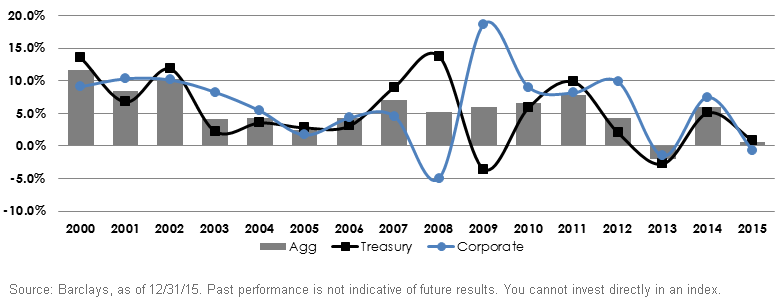Corporates over Treasuries: Unlocking Value in the Barclays U.S. Aggregate Index


 Key Takeaways
While the Agg has enjoyed positive total returns for every year shown above (except 2013), returns will likely be constrained going forward unless interest rates continue to fall. While economic uncertainty has benefited Treasuries at the expense of corporates so far in 2016, we believe corporates will likely outperform once rates start to rise, given their higher starting yields. In fact, corporates have outperformed Treasuries in 9 out of 16 calendar years. Given the increasing concentration in U.S. Treasuries in the Agg over this period, corporates have also tended to outperform the Agg in 10 out of 16 calendar years, including 4 out of the last 6 since the global financial crisis. In the most recent rising-rate period of 2004–2006, corporates enjoyed a period of solid outperformance compared to Treasuries and the Agg. As shown above, Treasuries tend to outperform corporates during recessions or other periods of prolonged stress.
Today, the market remains locked between two opposite forces: concerns about a marked slowdown in global growth vs. potential interest rate hikes by the Federal Reserve. In our current view, the probability of a global recession remains remote. In response, we believe a more intuitive approach to the Agg may be to over-weight the more attractive segments of the market (credit, securitized) and under-weight the most vulnerable, least appealing sector, such as U.S. Treasuries.
With these principles in mind, WisdomTree helped develop the Barclays U.S. Aggregate Enhanced Yield Index, which seeks to enhance the yield of the Agg by over-weighting the higher-yielding segments of the market.
Read more about WisdomTree income strategies.
1As represented by the Barclays U.S. Treasury Index.
2As represented by the Barclays U.S. Corporate Investment Grade Index.
Key Takeaways
While the Agg has enjoyed positive total returns for every year shown above (except 2013), returns will likely be constrained going forward unless interest rates continue to fall. While economic uncertainty has benefited Treasuries at the expense of corporates so far in 2016, we believe corporates will likely outperform once rates start to rise, given their higher starting yields. In fact, corporates have outperformed Treasuries in 9 out of 16 calendar years. Given the increasing concentration in U.S. Treasuries in the Agg over this period, corporates have also tended to outperform the Agg in 10 out of 16 calendar years, including 4 out of the last 6 since the global financial crisis. In the most recent rising-rate period of 2004–2006, corporates enjoyed a period of solid outperformance compared to Treasuries and the Agg. As shown above, Treasuries tend to outperform corporates during recessions or other periods of prolonged stress.
Today, the market remains locked between two opposite forces: concerns about a marked slowdown in global growth vs. potential interest rate hikes by the Federal Reserve. In our current view, the probability of a global recession remains remote. In response, we believe a more intuitive approach to the Agg may be to over-weight the more attractive segments of the market (credit, securitized) and under-weight the most vulnerable, least appealing sector, such as U.S. Treasuries.
With these principles in mind, WisdomTree helped develop the Barclays U.S. Aggregate Enhanced Yield Index, which seeks to enhance the yield of the Agg by over-weighting the higher-yielding segments of the market.
Read more about WisdomTree income strategies.
1As represented by the Barclays U.S. Treasury Index.
2As represented by the Barclays U.S. Corporate Investment Grade Index. Important Risks Related to this Article
Fixed income investments are subject to interest rate risk; their value will normally decline as interest rates rise. In addition, when interest rates fall, income may decline. Fixed income investments are also subject to credit risk, the risk that the issuer of a bond will fail to pay interest and principal in a timely manner or that negative perceptions of the issuer’s ability to make such payments will cause the price of that bond to decline.


